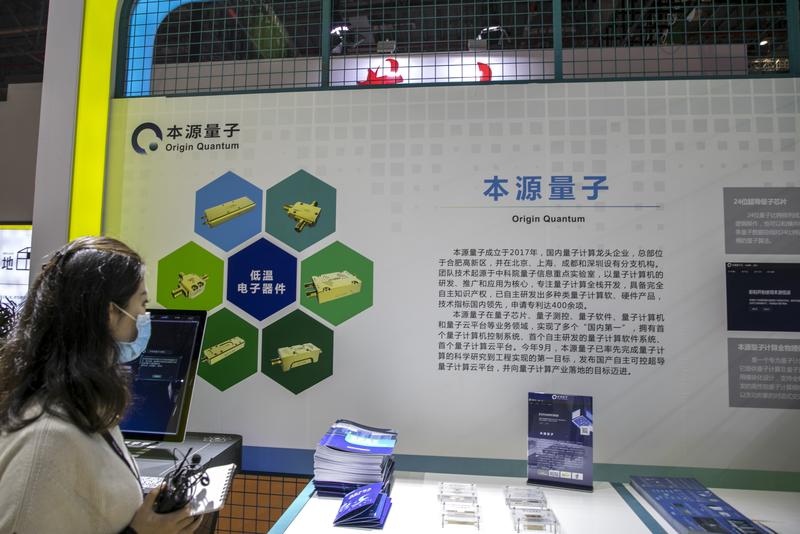 The booth of Origin Quantum during an expo in Shanghai. (PHOTO PROVIDED TO CHINA DAILY)
The booth of Origin Quantum during an expo in Shanghai. (PHOTO PROVIDED TO CHINA DAILY)
Amid Washington's increasingly tightened chip export restrictions on China, a Chinese company is working hard to hone its technologies in quantum computing chips, the next strategic frontier in which major economies are scrambling to establish a beachhead.
At China's first trial production line for quantum chips in Hefei, Anhui province, engineers at Origin Quantum, a startup founded in 2017, are busy testing products.
A quantum computing chip serves as the processor for quantum computers. These futuristic chips contain quantum bits, or "qubits" — quantum's key advantage over classical computing.
A classical computing bit can have a value of either 0 or 1, but a qubit can have a value that is either 0, 1 or a quantum superposition of 0 and 1. This gives quantum computers the ability to process some equations and algorithms exponentially faster than classical computers. The more qubits a quantum computer has, the more powerful it is, said Jia Zhilong, vice-president of Origin Quantum.
Jia said a superconductor chip production line was put into operation in January 2022. It has so far produced some 1,500 batches of chip products.
More cutting-edge tools have been developed to facilitate the production of quantum computers on the production line. NDPT-100, China's first non-destructive probe electrical measurement platform, was developed by Origin Quantum in December.
Both fast and accurate, the platform serves as a sharp "eye" to measure qubits resistance and can identify the quality of quantum chips with almost zero damage, greatly improving development efficiency.
"Our latest quantum computer Wukong will come out in half a year and the quantum chip dedicated for Wukong is going through debugging now," Jia said.
Wukong will feature a chip with over 64 qubits, Jia added.
It takes a 53-qubit quantum computer only 200 seconds to process calculations that the fastest supercomputer would take about 10,000 years to complete, said Dou Menghan, deputy director of the Anhui Quantum Computing Engineering Research Center.
Quantum computers can solve problems in areas such as artificial intelligence, pharmaceuticals and finance that are difficult for conventional computers to solve, Dou said.
Last year, Origin Quantum inked a deal with China Mobile, the world's largest telecom carrier with 956 million mobile subscribers, to explore ways to tap into quantum computing to overcome computational bottlenecks facing 5G and 6G technologies.
For now, quantum computing technology exists on a small scale, and companies such as Google, IBM and Origin Quantum are eyeing scale commercialization of quantum computers by 2030, experts said.
Global consulting firm McKinsey & Co expects quantum computing will have a conservative estimated value of up to $700 billion by 2035 for industries such as pharmaceuticals, chemicals, autos and finance.
China said in its 14th Five-Year Plan (2021-25) that it will speed up frontier science and technological blueprints, such as quantum computing and quantum communication.
Origin Quantum is ranked first in China and sixth in the world by the number of invention patents it has applied for in quantum computing, according to the latest Global Quantum Computing Technology Patent Filings Ranking List, released by innovation index researcher incoPat and intellectual property media IPR Daily in October.


